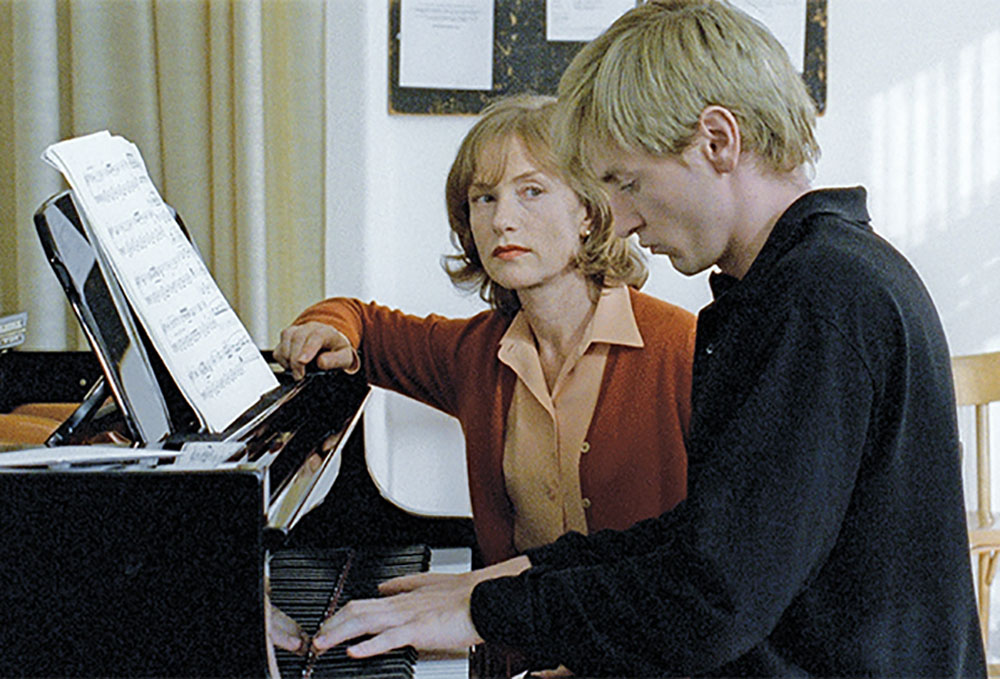Michael Haneke is one of the few capable directors, who can depict the trauma and extremities of the modern society so prominently and grotesquely into the screen. His 2001 film “The Piano Teacher” (“La pianiste,” original title) is a prime example of how bold he can go with his vision and aesthetics to bring these themes of extremities closer to us like never before. The film is so gut-wrenching and powerful that words like disturbing or unnerving are just massive understatements. Its breaks you down with disgust and repulsion that you can’t simply take out of your mind.
From Novel to Screen
Adapted from the 1983 novel by the same name by Elfriede Jelinek, the story revolves around Erika Kohut, a piano teacher in her late thirties in a Vienna music conservatory. Even at this age, she lives with her mother in a shared apartment as well as a shared bed. The mother is kind of a bully, who tries to control every aspect of Erika’s life—from what she would wear, where she would go, and even with whom she would interact. Even she doesn’t care much to interrogate and insult her own daughter if any of these gets violated.
From the first scene of the film, Haneke pushes us to this dysfunctional relationship right away without describing any proper description of these characters. Perhaps in Haneke’s point of view, these characters needn’t to be explained as they live within the perimeters of our real world. They are the people looking normal apparently; but deep inside they are far from being normal.
Erika is just another character like that. She may have a respected job and high status in society as a piano teacher; however, deep inside she has dark corners no one can ever expect. There is the possibility that this darkness within her comes from the struggle for control over her life.

An Exploration of Repressed Emotions
Her mother’s ever domineering persona towards her and her vulnerability to oppose her is the reason to harbor this struggle for control within Erika’s life. This domination leads Erika’s emotions to become repressed and subdued. And as Freud says, ‘Unexpressed emotion will never die. They are buried alive and will come forth later in uglier ways,’ her unexpressed emotions come forth in the violent form of fantasies of masochism and paraphilia.
From that source, she goes to porn theaters to see adult films, sniffs the semen-soaked tissues from previous costumers, voyeurs around couples only to sneak out their intimate moments, or even self-harming herself by cutting her genitalia with a razor blade. All has to do with fulfill her sexual fantasies.
But her fantasies take an ugly turn when a young student, Walter falls in love with her. At that moment her fantasies are not fantasies anymore; they become real. But this time, she loses her control over her desires, as she is not ready for them to come up; this leads to her ultimate downfall in the disturbing final act of the film.
Classic Haneke—’The Piano Teacher’ is a Metaphorical Stab to the Heart
The last act is the most difficult part to watch in the entire film. It is gut-wrenching as nothing else in the typical Haneke style of the sudden disorientation of the whole thing he has created leading to that point. Simply, it’s nothing less than a stab in the heart. Haneke uses long takes extensively in the entire movie, which prolongs the effect of unsettlement. For this it creates a deep impact on the audience. For this technique, it is more difficult for us to sit through the violent gut-wrenching sequences.
Above all, however, it is all about Isabelle’s performance in the lead role as Erika. Her calm, emotionless, deadpan face successfully complements the demands to portray the subdued and repressed character. Her expressionless face beautifully signifies the mask she wears over her insane nature from inside. It’s a pity for this flawless performance, Huppert was not nominated for an Oscar. Perhaps it is the subject matter too hard to bear for the Academy. But above all, with Haneke’s mastery over craft and Huppert’s intense performance on-screen, “The Piano Teacher” becomes one of the shocking films ever made for the big screen.
“The Piano Teacher” is available to stream on The Criterion Channel. You can also rent or buy the film from Apple TV, Prime Video, YouTube, and Google Play.